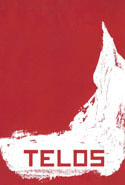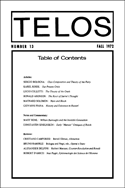By Michael Marder · Friday, June 16, 2017 Critique of phenomenology amounts to a tiny piece of the puzzle that is Gianni Vattimo and Santiago Zabala’s thought-provoking Hermeneutic Communism: From Heidegger to Marx. According to the spot allocated to it, phenomenology fits in with the other manifestations of classical metaphysics, bent on preserving the transcendental privilege of immutable truth. In what follows, I will argue that such placement may not do justice to phenomenology, which, in its most critical manifestations, is an ally of hermeneutic communism. This particular piece of the puzzle belongs on the other side of the intellectual and historical barricades, and, more importantly, holds the potential for mediating between the various opposed camps—description and interpretation, realism and anti-realism, the strong and the weak, metaphysics and postmetaphysics—that Vattimo and Zabala keep apart.
Continue reading →
By Christian Kronsted · Tuesday, August 13, 2013 As an occasional feature on TELOSscope, we highlight a past Telos article whose critical insights continue to illuminate our thinking and challenge our assumptions. Today, Christian Kronsted looks at Lowell A. Dunlap’s “Hume, James, and Husserl on the Self,” from Telos 2 (Fall 1968).
 With the publication of A Treatise Of Human Nature, David Hume turned the philosophical community of his time upside down with his provocative skepticism and denial of a cohesive self. Since its initial publication, Hume’s claim that the self is nothing but a bundle of perceptions has plagued philosophers and psychologists alike, and has inspired many to completely abandon the idea of a coherent self. Yet a central question remains largely unanswered: if there is not a self, what is doing the thinking, and how is it done? If a person does not have a “self,” how come human beings think of themselves as unique and separate entities that have subjective experiences? Lowell A. Dunlap’s article “Hume, James, and Husserl on the Self” investigates how William James and Edmund Husserl tackled the notion of personal identity in the aftermath of Hume’s philosophy. With the publication of A Treatise Of Human Nature, David Hume turned the philosophical community of his time upside down with his provocative skepticism and denial of a cohesive self. Since its initial publication, Hume’s claim that the self is nothing but a bundle of perceptions has plagued philosophers and psychologists alike, and has inspired many to completely abandon the idea of a coherent self. Yet a central question remains largely unanswered: if there is not a self, what is doing the thinking, and how is it done? If a person does not have a “self,” how come human beings think of themselves as unique and separate entities that have subjective experiences? Lowell A. Dunlap’s article “Hume, James, and Husserl on the Self” investigates how William James and Edmund Husserl tackled the notion of personal identity in the aftermath of Hume’s philosophy.
Continue reading →
By Damien Booth · Tuesday, October 16, 2012 As an occasional feature on TELOSscope, we highlight a past Telos article whose critical insights continue to illuminate our thinking and challenge our assumptions. Today, Damien Booth looks at Ronald Aronson’s “Interpreting Husserl and Heidegger: The Root of Sartre’s Thought” from Telos 13 (Fall 1972).
 Readers familiar with Jean-Paul Sartre’s philosophical writings understand that he inherited a great deal of his conceptual language from the phenomenological projects of Edmund Husserl and Martin Heidegger. In “Interpreting Husserl and Heidegger: The Root of Sartre’s Thought,” Ronald Aronson strips away much of the mystery from Sartre’s concepts and, in so doing, reveals something about the framework that Sartre inherits that may well restrict his philosophical project from the very start. The accusation Aronson levies against Sartre is that he opens up a gap between consciousness and the world, a gap that Husserl wished to close by developing his transcendental phenomenological method. Essentially, Aronson thinks that Sartre abandons the very developments that made Husserl’s and Heidegger’s projects tenable in the first place: “we find [Sartre] erasing all the structures of consciousness (emotional, cognitive, and social) which make the world intelligible and making consciousness into a ‘nothing'” (47). As a result, Sartre becomes tangled up in his “own conceptual apparatus.” To find out why he gets so conceptually confused by these entanglements, Aronson traces Sartre’s key concepts back to their roots in Husserl’s cognitive projects and Heidegger’s hermeneutic phenomenology. Readers familiar with Jean-Paul Sartre’s philosophical writings understand that he inherited a great deal of his conceptual language from the phenomenological projects of Edmund Husserl and Martin Heidegger. In “Interpreting Husserl and Heidegger: The Root of Sartre’s Thought,” Ronald Aronson strips away much of the mystery from Sartre’s concepts and, in so doing, reveals something about the framework that Sartre inherits that may well restrict his philosophical project from the very start. The accusation Aronson levies against Sartre is that he opens up a gap between consciousness and the world, a gap that Husserl wished to close by developing his transcendental phenomenological method. Essentially, Aronson thinks that Sartre abandons the very developments that made Husserl’s and Heidegger’s projects tenable in the first place: “we find [Sartre] erasing all the structures of consciousness (emotional, cognitive, and social) which make the world intelligible and making consciousness into a ‘nothing'” (47). As a result, Sartre becomes tangled up in his “own conceptual apparatus.” To find out why he gets so conceptually confused by these entanglements, Aronson traces Sartre’s key concepts back to their roots in Husserl’s cognitive projects and Heidegger’s hermeneutic phenomenology.
Continue reading →
|
|
 With the publication of A Treatise Of Human Nature, David Hume turned the philosophical community of his time upside down with his provocative skepticism and denial of a cohesive self. Since its initial publication, Hume’s claim that the self is nothing but a bundle of perceptions has plagued philosophers and psychologists alike, and has inspired many to completely abandon the idea of a coherent self. Yet a central question remains largely unanswered: if there is not a self, what is doing the thinking, and how is it done? If a person does not have a “self,” how come human beings think of themselves as unique and separate entities that have subjective experiences? Lowell A. Dunlap’s article “Hume, James, and Husserl on the Self” investigates how William James and Edmund Husserl tackled the notion of personal identity in the aftermath of Hume’s philosophy.
With the publication of A Treatise Of Human Nature, David Hume turned the philosophical community of his time upside down with his provocative skepticism and denial of a cohesive self. Since its initial publication, Hume’s claim that the self is nothing but a bundle of perceptions has plagued philosophers and psychologists alike, and has inspired many to completely abandon the idea of a coherent self. Yet a central question remains largely unanswered: if there is not a self, what is doing the thinking, and how is it done? If a person does not have a “self,” how come human beings think of themselves as unique and separate entities that have subjective experiences? Lowell A. Dunlap’s article “Hume, James, and Husserl on the Self” investigates how William James and Edmund Husserl tackled the notion of personal identity in the aftermath of Hume’s philosophy.  Readers familiar with Jean-Paul Sartre’s philosophical writings understand that he inherited a great deal of his conceptual language from the phenomenological projects of Edmund Husserl and Martin Heidegger. In “Interpreting Husserl and Heidegger: The Root of Sartre’s Thought,” Ronald Aronson strips away much of the mystery from Sartre’s concepts and, in so doing, reveals something about the framework that Sartre inherits that may well restrict his philosophical project from the very start. The accusation Aronson levies against Sartre is that he opens up a gap between consciousness and the world, a gap that Husserl wished to close by developing his transcendental phenomenological method. Essentially, Aronson thinks that Sartre abandons the very developments that made Husserl’s and Heidegger’s projects tenable in the first place: “we find [Sartre] erasing all the structures of consciousness (emotional, cognitive, and social) which make the world intelligible and making consciousness into a ‘nothing'” (47). As a result, Sartre becomes tangled up in his “own conceptual apparatus.” To find out why he gets so conceptually confused by these entanglements, Aronson traces Sartre’s key concepts back to their roots in Husserl’s cognitive projects and Heidegger’s hermeneutic phenomenology.
Readers familiar with Jean-Paul Sartre’s philosophical writings understand that he inherited a great deal of his conceptual language from the phenomenological projects of Edmund Husserl and Martin Heidegger. In “Interpreting Husserl and Heidegger: The Root of Sartre’s Thought,” Ronald Aronson strips away much of the mystery from Sartre’s concepts and, in so doing, reveals something about the framework that Sartre inherits that may well restrict his philosophical project from the very start. The accusation Aronson levies against Sartre is that he opens up a gap between consciousness and the world, a gap that Husserl wished to close by developing his transcendental phenomenological method. Essentially, Aronson thinks that Sartre abandons the very developments that made Husserl’s and Heidegger’s projects tenable in the first place: “we find [Sartre] erasing all the structures of consciousness (emotional, cognitive, and social) which make the world intelligible and making consciousness into a ‘nothing'” (47). As a result, Sartre becomes tangled up in his “own conceptual apparatus.” To find out why he gets so conceptually confused by these entanglements, Aronson traces Sartre’s key concepts back to their roots in Husserl’s cognitive projects and Heidegger’s hermeneutic phenomenology. 






